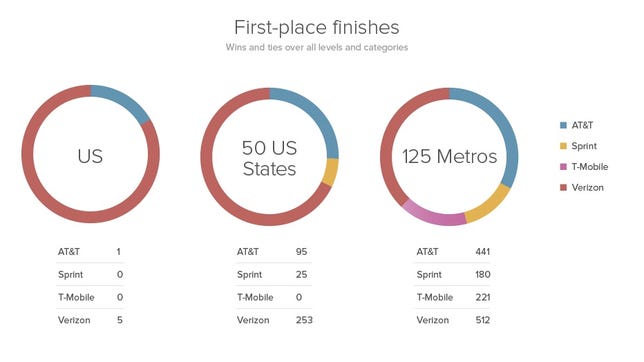
Sprint
Sprint, long the laggard in the national wireless service scene, can claim at least one minor victory over rival T-Mobile.
The nation’s fourth-largest carrier, which dropped one position in the past month thanks to T-Mobile’s speedier customer growth, scored a solid third place in a study by wireless testing firm RootMetrics of performance in the first half of 2015. The firm noted that Sprint’s call quality brought it into a virtual tie with AT&T, although it continued to lag behind in data speed.
Verizon Wireless once again reigned supreme over the industry, taking the top position for the fourth time in a row. AT&T followed closely behind, with Sprint a distant third. As in previous tests, T-Mobile is held back by poor performance outside of the major metropolitan areas, which has been its focus.
The results are ammunition for the ongoing wireless wars, with carriers competing on price, smartphone deals and, of course, network coverage. With consumers spending more time on their mobile devices, the perception of network superiority is critical to how the carriers sell themselves. That’s why interest in tests like the ones conducted by RootMetrics has picked up over the past few years.

 Enlarge Image
Enlarge ImageRootMetrics
Verizon walked away with nearly all the national RootMetrics awards, including best overall coverage, as well as categories such as network reliability and speed. AT&T only picked up an award for text messages. When factoring in all the awards for the 50 states, Verizon won 253, with AT&T a distant second with 95.
“Verizon’s performance across our testing of the US was excellent,” the firm said.
AT&T was closer than the numbers show, narrowly missing out on many awards, the firm added. “Don’t overlook AT&T,” the firm said.
“It’s always nice when our wireless network performance receives positive feedback from RootMetrics,” said an AT&T spokeswoman.
The more interesting movement came from the bottom two players.
Sprint has long been maligned for its poor coverage and slow network connection. But that’s no longer the case.
As with the last study, Sprint made its gains by improving the nuts and bolts of its service — namely its call performance and reliability of its text messages. But the firm noted that the carrier has improved its network speeds and reliability thanks to the further deploy of “Sprint Spark,” its name for the use of three different bands of radio airwaves for better coverage.


James Martin/CNET
The firm said that the network improvements put into Sprint are starting to show up beyond the metro areas and into smaller markets too.
“Overall we’re closing the gap on the competition, we’re keenly focused on data speeds, and we expect to soon lead in speed in some key markets,” said a Sprint spokeswoman.
T-Mobile has spent the last two years turning around its network reputation, with the company and firebrand CEO John Legere touting the nation’s fastest network. That may be true in many markets, but the lack of broader coverage again hurt its rating under RootMetrics.
“If you primarily use your smartphone in a major urban environment, T-Mobile remains a solid choice,” the firm said.
T-Mobile’s focus on data showed in the results. Nationally, it ranked third in both data performance and network speed — and ranked last in every other major category.
The company has been working to improve its coverage across the nation, including using additional radio airwaves for more reliable service outside of the big cities.
While T-Mobile didn’t have a comment on the latest results, Legere has slammed RootMetrics as a firm using outdated data. He and his company point to Speedtest.net as proof of T-Mobile’s network superiority, calling it real-time data.
Still, plenty of people look at RootMetrics’ test scores too.



